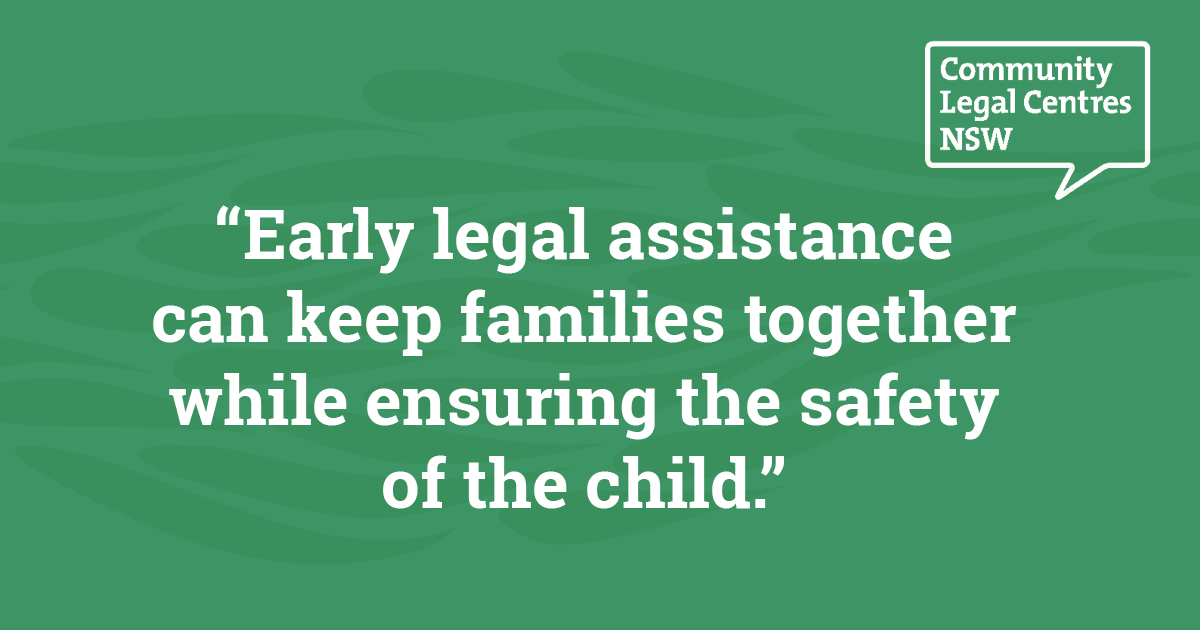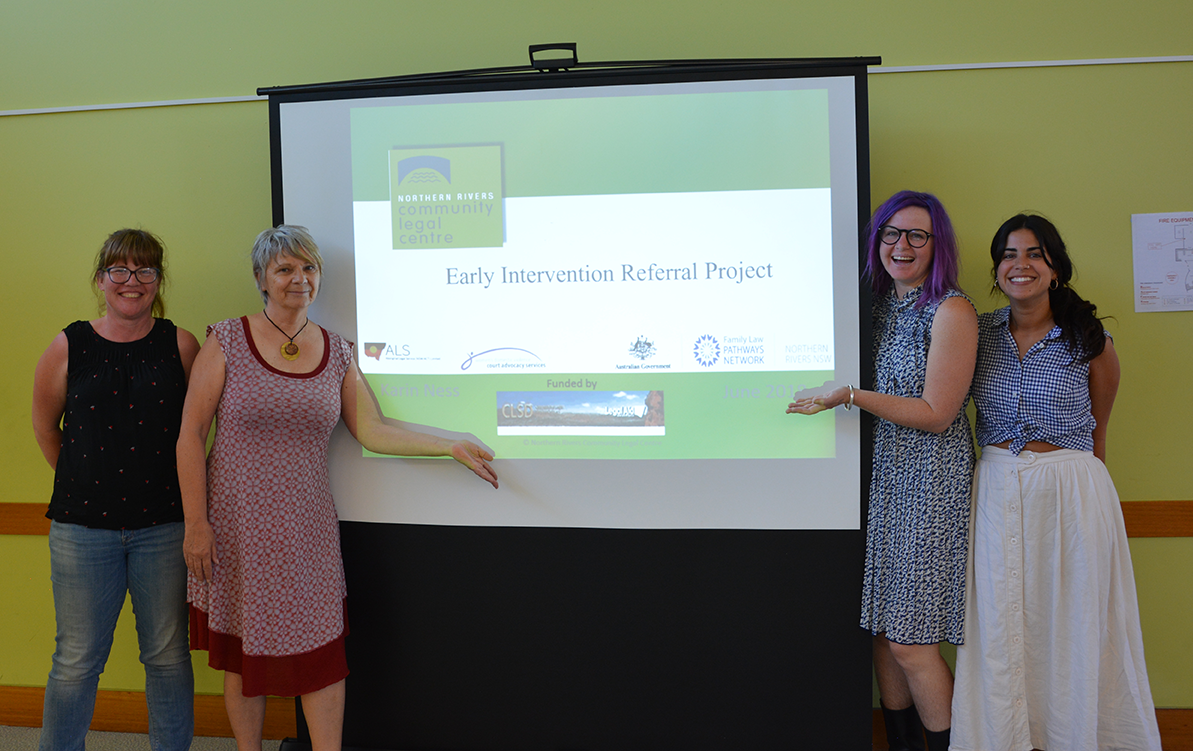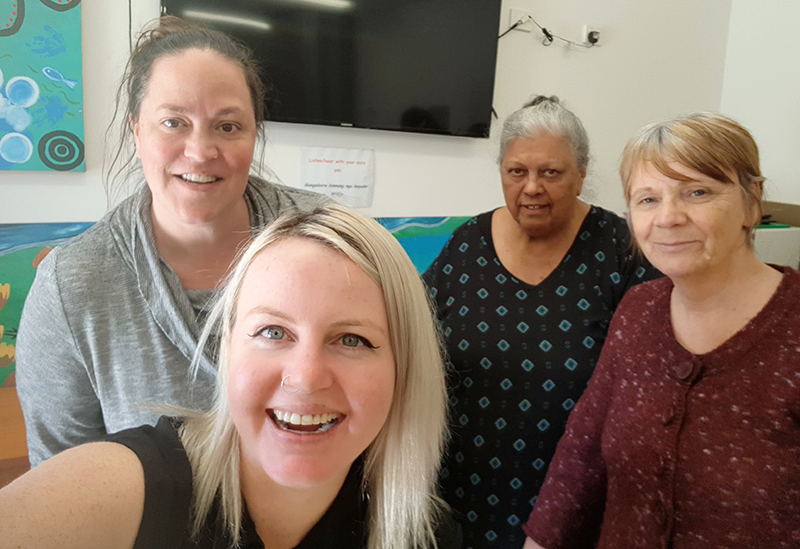
Article by Charlotte Buckton and Karin Ness, Northern Rivers Community Legal Centre.
Early independent legal advice in child protection matters is crucial to helping parents explore their options to prevent permanent child removal.
A review of Children’s Court documents for clients presenting at Northern Rivers Community Legal Centre (NRCLC) for advice after their children have been removed often reveals points within the process where early intervention legal advice could have provided the client with the opportunity to prevent their children being removed.
The benefits of early legal advice are that solicitors can:
- Explain to clients what their rights are if the Department of Family and Community Services (FACS) make contact , as well as the responsibilities that FACS workers have;
- Liaise with FACS workers to help clients understand the safety concerns which led FACS to make contact, what FACS is asking the client to do to address the safety concerns, and ensure that what FACS is asking the client to do will address the safety concerns;
- Encourage engagement with support services and warmly refer clients to support services they may need to keep their children with them;
- Advise of the importance of child-focused insight, action and positive engagement;
- Advise of the consequences of not addressing the safety of the child;
- Liaise with FACS to encourage the use of early intervention tools such as family group conferencing (FGC’s) and Family Actions Plans as an alternative to an application for removal being made in the Children’s Court; and
- Advise clients about options for avoiding a care application being made in the Children’s Court, including making an application in the Federal Circuit Court for Family Law Orders.
In short, early legal assistance can keep families together while ensuring the safety of the child.
Our clients often have a history of negative interactions with FACS or at least a negative perception of FACS. This can limit the engagement clients have with FACS or prevent clients from taking in the information provided by FACS caseworkers.
Having a solicitor provide this information to the client instead can help clients avoid a trigger response when communicating with FACS directly.
Barriers to early legal assistance
Underpinning the Safe Home for Life changes to child protection, which elevated adoption and guardianship in the hierarchy of child placements, was the use of early intervention mechanisms including access to early intervention legal services. Unfortunately, FACS allocated only a small amount of funding to community legal centre’s for this purpose. Even despite this minimal funding alloaction, legal services continue to receive a lack of referrals from FACS in relation to early intervention matters.
Our sector recommends that, for the benefit of children, parents and families, FACS workers be obliged to refer parents to legal assistance services at first contact.
Research undertaken by the Law and Justice Foundation of NSW shows that while vulnerable clients often do not seek out legal assistance, they often present to community and health service workers for help with a range of issues.(1)
Legal services in the Northern Rivers region have reported that they often see clients for the first time when they require representation in the Children’s Court. Community service and health workers in this regard are the crucial link to accessing justice for clients presenting with child protection and domestic violence issues.
The problem is that community service workers do not generally have the tools to identify a legal issue, access appropriate referral pathways for legal advice and also be able to effectively identify and address the barriers that clients have in accessing early intervention legal advice.
Early Intervention Referral Project
To address and overcome the lack of referrals made by FACS for early legal assistance, Northern Rivers Community Legal Centre partnered with a range of community services working with families experiencing FACS intervention to create the child protection Early Intervention Referral Project.
The aim of the Project is to provide sector development for frontline service workers across the Northern Rivers region to guide effective responses to child protection and domestic and family violence presentations, with an emphasis on early referral to legal services and specialist domestic violence services.

Above: The EIRP session in Yamba with Meg Bennet, Karin Ness, Charlotte Buckton, and Jo Collautti.
The Early Intervention Referral Project has two parts:
- Ongoing legal education workshops/seminars for service providers and community members, with a focus on explaining why it is important for service providers to refer clients for independent legal advice as soon as FACS become involved with a particular family, as well as helping us understand and address the barriers that people have in accessing early intervention legal advice.
- The development of two referral tools to assist service providers to make appropriate referrals to legal services and specialist domestic violence services:
- Referral cards: providing the numbers of free legal advice services of one side and free domestic and family violence specialist services on the other which can be distributed to all clients presenting with child protection or domestic and family violence matters; and
- Referral map: detailing the stages of FACS intervention prior to children’s court proceedings being initiated and the reasons why it is important to refer clients for legal advice at each of these stages.
Since the Project has been rolled out, Northern Rivers Community Legal Centre has seen an increase in referrals from service providers in early intervention care and protection matters.
The increase in referrals has led to families being assisted to understand their rights and responsibilities and to more effectively navigate the child protection system.



